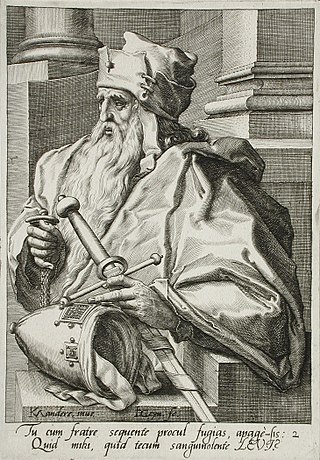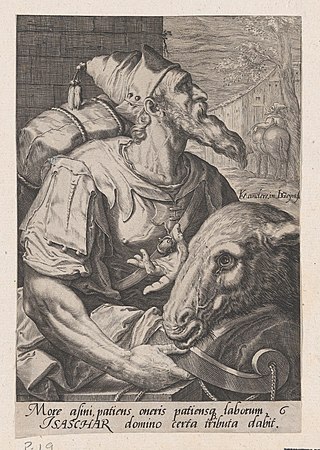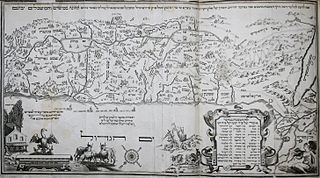Related Research Articles
In the Book of Exodus, Amram is the husband of Jochebed and father of Aaron, Moses and Miriam.

The Torah is the compilation of the first five books of the Hebrew Bible, namely the books of Genesis, Exodus, Leviticus, Numbers and Deuteronomy. The Torah is known as the Pentateuch or the Five Books of Moses by Christians. It is also known as the Written Torah in Jewish tradition. If meant for liturgic purposes, it takes the form of a Torah scroll. If in bound book form, it is called Chumash, and is usually printed with the rabbinic commentaries.
Kohen is the Hebrew word for "priest", used in reference to the Aaronic priesthood, also called Aaronites or Aaronides. They are traditionally believed and halakhically required to be of direct patrilineal descent from the biblical Aaron, brother of Moses, and thus belong to the Tribe of Levi.

Levi was, according to the Book of Genesis, the third of the six sons of Jacob and Leah, and the founder of the Israelite Tribe of Levi and the great-grandfather of Aaron, Moses and Miriam. Certain religious and political functions were reserved for the Levites.

According to the Bible, Jochebed was a daughter of Levi and mother of Miriam, Aaron and Moses. She was the wife of Amram, as well as his aunt. No details are given concerning her life. According to Jewish legend, she is buried in the Tomb of the Matriarchs, in Tiberias. In the New Testament, she is praised for her faith in God.

Issachar was, according to the Book of Genesis, the fifth of the six sons of Jacob and Leah, and the founder of the Israelite Tribe of Issachar. However, some Biblical scholars view this as an eponymous metaphor providing an aetiology of the connectedness of the tribe to others in the Israelite confederation.

Ephraim was, according to the Book of Genesis, the second son of Joseph ben Jacob and Asenath. Asenath was an Ancient Egyptian woman whom Pharaoh gave to Joseph as wife, and the daughter of Potipherah, a priest of ʾĀwen. Ephraim was born in Egypt before the arrival of the Israelites from Canaan.
The Gershonites were one of the four main divisions among the Levites in Biblical times. The Bible claims that the Gershonites were all descended from the eponymous Gershon a son of Levi, although some biblical scholars regard this as a postdictional metaphor providing an aetiology of the connectedness of the clan to others in the Israelite confederation.
According to the Torah, Gershon was the eldest of the sons of Levi, and the patriarchal founder of the Gershonites, one of the four main divisions among the Levites in biblical times. The Gershonites were charged with the care of the outer tabernacle including components such as the tent and its covering, screens, doors, and hangings. Biblical scholars regard the name as being essentially the same as "Gershom", which appears to mean "a sojourner there", and it is Gershom rather than Gershon who is sometimes listed in the Book of Chronicles as a founder of one of the principal Levite factions. The Torah names Gershon's sons as Libni and Shimei.

Zebulun was, according to the Books of Genesis and Numbers, the last of the six sons of Jacob and Leah, and the founder of the Israelite Tribe of Zebulun. Some biblical scholars believe this to be an eponymous metaphor providing an aetiology of the connectedness of the tribe to others in the Israelite confederation. With Leah as a matriarch, biblical scholars believe the tribe to have been regarded by the text's authors as a part of the original Israelite confederation.

According to the Torah, Kehath or Kohath was one of the sons of Levi and the patriarchal founder of the Kehathites, one of the four main divisions of the Levites in biblical times. In some apocryphal texts, such as the Testament of Levi and the Book of Jubilees, Levi's wife, Kehath's mother, is Milkah, a daughter of Aram.
According to the Torah, Uzziel was the father of Mishael, Elzaphan, and Zithri, and was a son of Kohath and grandson of Levi, consequently being the brother of Amram and uncle of Aaron, Miriam, and Moses. Uzziel is portrayed in the text as the founder of the Uzzielite faction of Levites; however, despite Uzziel supposedly being Kohath's son, and Elzaphan's father, on some occasions the Book of Chronicles treats the Uzzielites as being quite distinct from the descendants of Kohath, and from those of Elzaphan.
Richard Elliott Friedman is an American biblical scholar, theologian, and translator who currently serves as the Ann and Jay Davis Professor of Jewish Studies at the University of Georgia.

The first tithe is a positive commandment in the Torah requiring the giving of one tenth of agricultural produce to charity, after the giving of the standard terumah, to the Levite. This tithe is required to be free of both monetary and servicial compensation.
The Kohathites were one of the four main divisions among the Levites in biblical times, the other three being the Gershonites, the Merarites, and the Aaronites. The Bible claims that the Kohathites were all descended from the eponymous Kohath, a son of Levi.
According to the Torah, Hebron was a son of Kohath and grandson of Levi, consequently being the brother of Amram and uncle of Aaron, Miriam, and Moses. Hebron is portrayed in the text as the founder of the Hebronite clan of Levites; however, on some occasions, the Book of Chronicles treats the Hebronites as being distinct from the descendants of Kohath.
The Merarites were one of the four main divisions among the Levites in Biblical times. The Bible claims that the Merarites were all descended from the eponymous Merari, a son of Levi, although some biblical scholars regard this as a postdictional metaphor, providing an origin myth of the connectedness of the clan to others in the Israelite confederation;.

1 Chronicles 6 is the sixth chapter of the Books of Chronicles in the Hebrew Bible or the First Book of Chronicles in the Old Testament of the Christian Bible. The book is compiled from older sources by an unknown person or group, designated by modern scholars as "the Chronicler", and had the final shape established in late fifth or fourth century BCE. This chapter focuses on the tribe of Levi, divided into the line of the high priests ; the three lines of the families Gershom, Kohath, and Merari ; the lines of the musicians/singers ; duties of Levites and priests ; list of high priests and the Aaronites' and Levites' settlements. It belongs to the section focusing on the list of genealogies from Adam to the lists of the people returning from exile in Babylon.

According to the Bible, the Tribe of Levi is one of the tribes of Israel, traditionally descended from Levi, son of Jacob. The descendants of Aaron, who was the first High Priest of Israel, were designated as the priestly class, the Kohanim.
References
- ↑ Numbers 3:21
- ↑ Meaning, origin and etymology of the name Merari, Abarim Publications
- ↑ Numbers 4:29-33
- ↑ Richard Elliott Friedman, Who Wrote The Bible?
- ↑ Peake's Commentary on the Bible
- ↑ Jewish Encyclopedia
- ↑
 This article incorporates text from a publication now in the public domain : Singer, Isidore; et al., eds. (1901–1906). The Jewish Encyclopedia . New York: Funk & Wagnalls.
This article incorporates text from a publication now in the public domain : Singer, Isidore; et al., eds. (1901–1906). The Jewish Encyclopedia . New York: Funk & Wagnalls.{{cite encyclopedia}}: Missing or empty|title=(help)